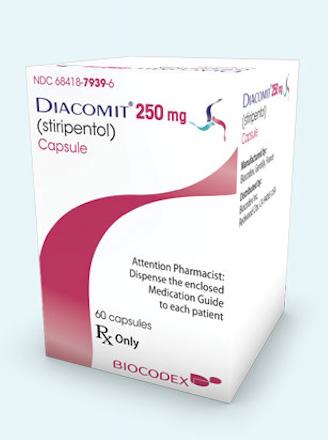Diacomit Interactions
There are 622 drugs known to interact with Diacomit (stiripentol), along with 7 disease interactions, and 1 alcohol/food interaction. Of the total drug interactions, 85 are major, 517 are moderate, and 20 are minor.
- View all 622 medications that may interact with Diacomit
- View Diacomit alcohol/food interactions (1)
- View Diacomit disease interactions (7)
Most frequently checked interactions
View interaction reports for Diacomit (stiripentol) and the medicines listed below.
- Actemra (tocilizumab)
- Adriamycin (doxorubicin)
- Advate (antihemophilic factor)
- Afinitor Disperz (everolimus)
- Austedo (deutetrabenazine)
- Bactrim DS (sulfamethoxazole / trimethoprim)
- Creon (pancrelipase)
- Cytoxan (cyclophosphamide)
- Diamox (acetazolamide)
- enalapril
- Etopophos (etoposide)
- Exforge HCT (amlodipine / hydrochlorothiazide / valsartan)
- Fintepla (fenfluramine)
- Imbruvica (ibrutinib)
- Inderal (propranolol)
- Jynarque (tolvaptan)
- Kalydeco (ivacaftor)
- Luxturna (voretigene neparvovec ophthalmic)
- methotrexate
- Meticorten (prednisone)
- MS Contin (morphine)
- Ocrevus (ocrelizumab)
- Ofev (nintedanib)
- Oncovin (vincristine)
- Onfi (clobazam)
- Onpattro (patisiran)
- prednisone
- Rapamune (sirolimus)
- Sensipar (cinacalcet)
- Velcade (bortezomib)
Diacomit alcohol/food interactions
There is 1 alcohol/food interaction with Diacomit (stiripentol).
Diacomit disease interactions
There are 7 disease interactions with Diacomit (stiripentol) which include:
- suicidal tendency
- decreased appetite/weight
- hepatic impairment
- neutropenia/thrombocytopenia
- phenylketonuria
- renal impairment
- somnolence
More about Diacomit (stiripentol)
- Diacomit consumer information
- Compare alternatives
- Pricing & coupons
- Drug images
- Side effects
- Dosage information
- During pregnancy
- FDA approval history
- Drug class: gamma-aminobutyric acid reuptake inhibitors
- Breastfeeding
- En español
Related treatment guides
Drug Interaction Classification
| Highly clinically significant. Avoid combinations; the risk of the interaction outweighs the benefit. | |
| Moderately clinically significant. Usually avoid combinations; use it only under special circumstances. | |
| Minimally clinically significant. Minimize risk; assess risk and consider an alternative drug, take steps to circumvent the interaction risk and/or institute a monitoring plan. | |
| No interaction information available. |
See also:
Further information
Always consult your healthcare provider to ensure the information displayed on this page applies to your personal circumstances.


